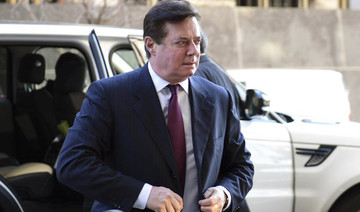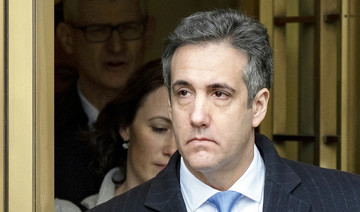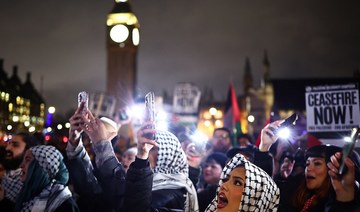ALEXANDRIA, Virginia: President Donald Trump’s former campaign chairman Paul Manafort was sentenced on Thursday by a US judge to less than four years in prison — far shy of federal sentencing guidelines — for financial crimes uncovered during Special Counsel Robert Mueller’s investigation into Russia’s role in the 2016 election.
US District Judge T.S. Ellis imposed the 47-month sentence on Manafort, 69, during a hearing in Alexandria, Virginia in which the veteran Republican political consultant asked for mercy but did not express remorse for this actions. Ellis also ordered Manafort to pay a fine of $50,000.
Manafort was found guilty last August by a jury of five counts of tax fraud, two counts of bank fraud and one count of failing to disclose foreign bank accounts.
While prosecutors had not recommended a specific sentence, they had cited federal sentencing guidelines that called for 19-1/2 to 24 years in prison. But Ellis said the sentencing guidelines were excessive and would create “an unwarranted disparity” with other cases.
Ellis also noted during the hearing that Manafort “is not before the court for any allegations that he, or anyone at his direction, colluded with the Russian government to influence the 2016 election.”
Before the sentencing, Manafort thanked Ellis for conducting a fair trial. He expressed no remorse but talked about how the case has been difficult for him and his family. Manafort, who opted not to testify during his trial, told the court that “to say I have been humiliated and ashamed would be a gross understatement.” He described his life as “professionally and financially in shambles.”
Manafort was convicted after prosecutors accused him of hiding from the US government millions of dollars he earned as a consultant for Ukraine’s former pro-Russia government. After pro-Kremlin Ukrainian President Viktor Yanukovych’s ouster, prosecutors said, Manafort lied to banks to secure loans and maintain an opulent lifestyle with luxurious homes, designer suits and even a $15,000 ostrich-skin jacket.
The judge told Manafort: “I was surprised I did not hear you express regret for engaging in wrongful conduct.”
Manafort, with noticeably grayer hair than just months ago, was brought into the courtroom in a wheelchair holding a cane, wearing a green prison jumpsuit emblazoned with the words “Alexandria inmate” on the back. It was a far cry from Manafort’s usual dapper appearance and stylish garb. He has been jailed leading up to his sentencing.
The sentence was even less than what defense lawyers had sought. They had asked Ellis to sentence Manafort to between 4-1/4 and 5-1/4 years in prison, writing in their sentencing memo that Mueller’s “attempt to vilify Mr. Manafort as a lifelong and irredeemable felon is beyond the pale and grossly overstates the facts before this court.”
His defense team argued he should get a lighter sentence because he had agreed to cooperate with the prosecution after he was convicted — though another judge found he breached that deal by repeatedly lying to prosecutors — and because his bid to secure a $5.5 million bank loan on fraudulent premises did not actually succeed. Ellis rejected those efforts.
Greg Andres, a prosecutor on Mueller’s team, urged Ellis during the hearing to impose a steep sentence. “This case must stand as a beacon to others that this conduct cannot be accepted,” Andres said.
Manafort faces sentencing in a separate case next Wednesday in Washington on two conspiracy charges to which he pleaded guilty last September.
While he faces a statutory maximum of 10 years in the Washington case, US District Judge Amy Berman Jackson potentially could stack that on top of the sentence imposed in the Virginia case, rather than allowing the sentences to run concurrently.
Manafort is the only one of the 34 people and three companies charged by Mueller to have gone to trial. Several others including former campaign aides Rick Gates and George Papadopoulos, former national security adviser Michael Flynn and former Trump personal lawyer Michael Cohen have pleaded guilty, while longtime Trump adviser Roger Stone has pleaded not guilty.
Gates, a key witness against Manafort, has yet to be sentenced due to his ongoing cooperation with prosecutors.
Trump, who has called Mueller’s investigation a politically motivated “witch hunt,” has not ruled out granting a presidential pardon to Manafort, saying in November that “I wouldn’t take it off the table.”
Jackson on Feb. 13 ruled that Manafort had breached his agreement to cooperate with Mueller’s office by lying to prosecutors about three matters pertinent to the Russia probe including his interactions with a business partner they have said has ties to Russian intelligence.
Mueller is preparing to submit to US Attorney General William Barr a report on his investigation into whether Trump’s campaign conspired with Russia and whether Trump has unlawfully sought to obstruct the probe. Trump has denied collusion and obstruction and Russia has denied election interference.
The crimes for Manafort was convicted did not directly relate to the 2016 election.
The sentencing capped a stunning downfall for Manafort, a prominent figure in Republican Party circles for decades who also worked as a consultant to such international figures as former Angolan rebel leader Jonas Savimbi, former Philippine President Ferdinand Marcos and Yanukovych.
Manafort worked for Trump’s campaign for five pivotal months in 2016 that included the Republican National Convention where Trump accepted the Republican presidential nomination, three of them as campaign chairman.
Ellis had faced criticism by some in the legal community for comments he made during the trial that were widely interpreted as biased against the prosecution.
Ellis repeatedly interrupted prosecutors, told them to stop using the word “oligarch” to describe people associated with Manafort because it made him seem “despicable,” and objected to pictures of Manafort’s luxury items they planned to show jurors.
“It isn’t a crime to have a lot of money and be profligate in your spending,” Ellis told prosecutors during the trial.
US judge sentences Trump ex-aide Manafort to under 4 years in prison
US judge sentences Trump ex-aide Manafort to under 4 years in prison
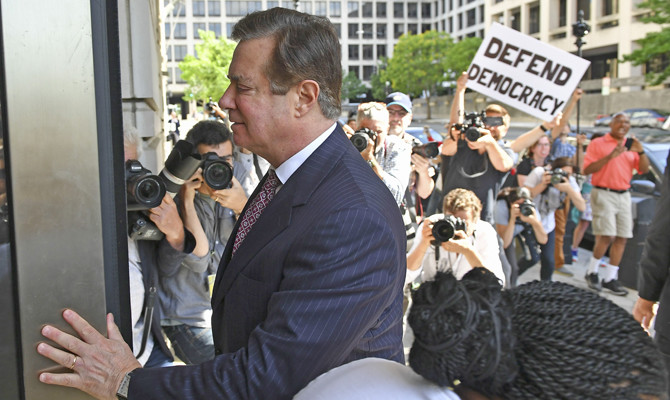
- Manafort was found guilty of tax fraud, bank fraud and failing to disclose foreign bank accounts
- He faces sentencing in a separate case on two conspiracy charges to which he pleaded guilty
India BJP’s election videos targeting Muslims and opposition spark outrage
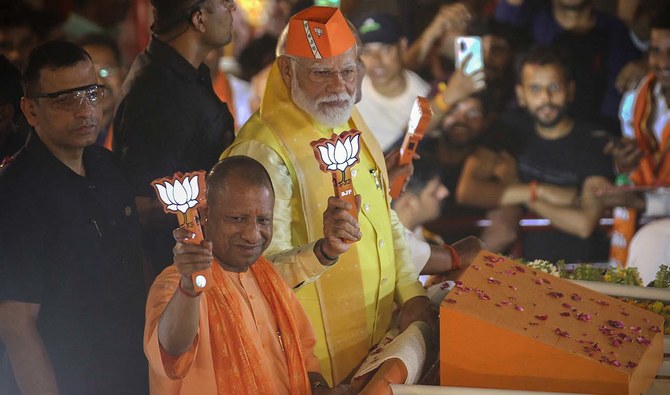
- Videos shared by BJP depict Congress giving disproportionate benefits to Muslims over tribal and Hindu groups
- Manipulated videos have become contentious issue in polls, such as fake videos of top Bollywood stars criticizing Modi
NEW DELHI, May 6 : Animated videos shared by Prime Minister Narendra Modi’s party targeting opposition Congress and the Muslim community have evoked complaints and outrage, as the political climate in India heats up midway through its six-week long election.
The videos, shared by the ruling Bharatiya Janata Party on social media platforms Instagram and X over the last ten days, depict the Congress giving disproportionate benefits to India’s minority Muslim community, at the cost of certain disadvantaged tribal and Hindu caste groups.
The Congress, in a complaint to the poll watchdog Election Commission, said on Sunday that the video has been shared “clearly with an intention to wantonly provocate rioting and promote enmity between different religions.”
A set of guidelines mutually adopted by political parties for how they should conduct themselves during the election period prohibit them from creating “mutual hatred” between caste, religious or linguistic groups.
Manipulated videos on social media have also become a contentious issue in this election, such as fake videos showing top Bollywood stars criticizing the prime minister.
On Monday, the commission warned parties against the misuse of AI tools to create deep fakes and told them not to publish and circulate such videos. It also said parties had been directed to remove such content within three hours of it being brought to their notice.
Modi, the face of the Hindu-nationalist BJP, seeking a rare third consecutive term, had focused his campaign largely on his government’s performance on economic growth and welfare benefits.
But he changed tack after the first phase of voting on April 19 and his campaign speeches have since become more polarizing on religious lines, accusing Congress of planning to redistribute the wealth of the majority Hindus among minority Muslims, who he called “infiltrators” who have “more children.”
The videos shared by the BJP over the last ten days, one of which has since been taken down, illustrated the same message.
A 17-second video shared by a state unit of BJP on May 4, with over 8.5 million views, shows a character resembling Congress leader Rahul Gandhi feeding “funds” to a bird in a skullcap, which eventually pushes out from their common nest three other birds representing other disadvantaged groups.
The Congress has filed a police complaint against BJP leaders for the video, BJP’s head of information and technology Amit Malviya said on X.
“The Congress should in fact thank the BJP for taking their manifesto to the people in a manner that even they couldn’t,” he wrote.
The video has elicited outrage. Nitasha Kaul, a politics professor at London’s Westminster University said on X that the video was a “straightforward 1930s Germany style cartoon.”
In its manifesto for the elections, the Congress has promised to tackle India’s economic inequality by conducting a socio-economic caste census and extending affirmative action. It said it will ensure that minorities receive “their fair share” of education, economic and health care opportunities.
An Election Commission spokesperson, the BJP’s Malviya and Congress spokespersons did not respond to requests seeking comment.
Bangladeshi students rally in solidarity with global student movement against Israel
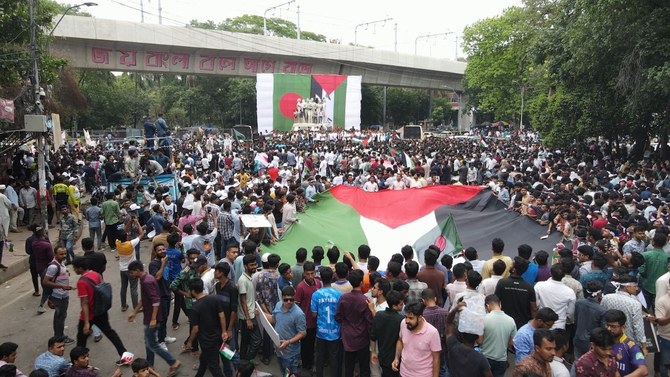
- US student protests have sparked more around the world, including in India, France, Australia
- Dhaka’s thousands-strong rally took place at Bangladesh’s largest, oldest tertiary institution
DHAKA: Thousands of people protesting Israel’s war on Gaza rallied at one of Bangladesh’s top universities on Monday in solidarity with the student-led protests and occupations sweeping the globe.
Pro-Palestinian student leaders and activists from different universities marched and carried flags of Bangladesh and Palestine, chanting slogans in solidarity with Gaza as they made their way to Dhaka University, Bangladesh’s largest and oldest tertiary institution.
Their protest culminated at the symbolic Aparajeyo Bangla sculpture, one of the most well-known landmarks dedicated to the Bangladesh Liberation War of 1971.
“Our stance is very clear: We express solidarity in support of a free Palestine state, in favor of a world free from war. And we support the demands made by US students, like divestment from Israel and other organizations that support the Israeli aggression,” Saddam Hussain, president of the organizing student group Bangladesh Students’ League, told Arab News.
They are also rallying in solidarity with the global student movement, he added.
“We believe all protests hold the same spirit of the youth, be it on the banks of the Atlantic or here on the bank of River Padma,” he said.
“The youths around the world have a common dream, and I urge all of them to move forward to make this dream come true. I hope all the youths of the world will join in this protest to build a world free from war, free and guided with humanitarian spirit.”
The Israeli strikes on Gaza that began in October have killed nearly 35,000 people in the Palestinian territory, mostly women and children. The leader of the World Food Program said over the weekend that parts of the Gaza strip were experiencing a “full-blown famine” that was spreading across the besieged enclave.
Students started to rally or set up tents at various universities around the US last month to protest Israel’s war on Gaza, sparking a global solidarity movement among the youth in India, Australia, France and elsewhere, with many putting pressure on their administrators and governments to cut ties with Tel Aviv.
While US colleges have seen protests since October, the unrest has escalated in recent weeks after police arrested pro-Palestine demonstrators at an encampment in Columbia University, sparking even more campsites at other campuses, as well as more crackdowns and arrests.
Unlike in the US, students in Dhaka were able to protest peacefully with scant police presence.
“The US and some other big players always speak in favor of freedom of speech. But what we have seen in the university campuses in the US is a shame for world leaders,” Solaiman Khan, a 23-year-old Dhaka University student, told Arab News.
“It’s a double standard. We, the youth (of Bangladesh), came out to the streets against this sort of hypocrisy from the superpowers of the world.”
Khan said the violence against Palestinians must be “stopped now and forever.”
“We have seen enough atrocities done by the Israeli forces. How many more lives must the world lose? Is it not enough?” he said.
“I think world leaders should come to their senses and act more rationally in stopping the atrocities in Gaza orchestrated by the occupying Israeli forces. Now is the time to play a decisive role. Otherwise, the next generation will not forgive us.”
Pro-Palestine Oxbridge students set up encampments

- They are demanding transparency about the universities’ financial links to Israel
- ‘We will not move until our demands are met’
LONDON: Students at the universities of Oxford and Cambridge have set up encampments in support of Palestine, The Times reported on Monday.
Around 50 have refused to leave the lawn of King’s College, Cambridge, while students have also declared a “liberated zone” outside Oxford’s Pitt Rivers Museum.
A banner hung outside King’s College read: “Welcome to the people’s university for Palestine.” Chants of “stop the bombing now” have also been heard on the campus.
The protests have been organized by Oxford Action for Palestine and Cambridge for Palestine.
They are demanding transparency about the universities’ financial links to Israel, which they have described as a “settler colonial state,” and are calling for the end of all investments and endowments from Israeli and Israel-linked companies.
“We have set up camp in university grounds, and we will not move until our demands are met,” the groups said in a statement, adding that the universities are legitimate targets for protests because of their “role in the British empire and its disastrous colonial legacies.”
The Times reported that protesters had been given an itinerary for their involvement including “de-escalation training” and “banner-making.”
A spokesperson for Cambridge University said it is for the college to decide whether to call the police, adding: “The university is fully committed to academic freedom and freedom of speech within the law and we acknowledge the right to protest.
“We ask everyone in our community to treat each other with understanding and empathy. Our priority is the safety of all staff and students.
“We will not tolerate antisemitism, Islamophobia and any other form of racial or religious hatred, or other unlawful activity.”
The relatively small UK protests come after nearly 2,000 people were arrested across the US after widespread demonstrations on over 130 American university campuses about Israel’s ongoing war in Gaza.
Muslim group issues UK Labour Party leader with demands over Gaza
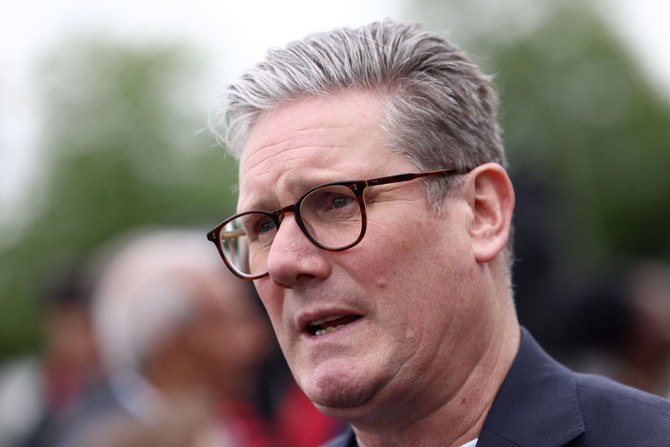
- Muslim Vote group calls for ‘real action’ to regain trust
- Support for Labour in recent local elections fell in areas with high Muslim populations
LONDON: Pro-Palestinian activists have presented a list of 18 demands to the leader of Britain’s opposition Labour Party and said they will not vote for the party at the next general election if he does not fulfill them.
The Muslim Vote, a campaign to get Muslim voters to back pro-Palestine candidates, has called for Sir Keir Starmer to promise to cut military ties with Israel, implement a travel ban on Israeli politicians involved in the war in Gaza and impose sanctions on companies operating in occupied territories.
The group told Starmer he must commit to “real action” and deliver on its requests if he was “serious” about his pledge to rebuild trust with those angered by his stance on the conflict in Gaza, The Telegraph reported.
Supporters would vote for the Green Party or Liberal Democrats if he could not commit to their demands, it said.
Labour’s campaign chief Pat McFadden acknowledged that Starmer’s approach to the conflict had cost the party votes at last week’s local elections. Support for Labour dropped dramatically in areas with a high Muslim populations, including Oldham in Greater Manchester, where the party lost overall control of the council in a shock defeat.
After the result, Starmer said he was determined to regain the trust of those who abandoned Labour as a result of his stance on the Gaza war but did not make any concrete pledges on the matter.
The Muslim Vote challenged Starmer with committing to the 18 demands and implementing them should he become the next prime minister.
They include removing the definition of extremism introduced by Secretary of State for Leveling Up, Housing and Communities Michael Gove and issuing guidance that allows Muslims to pray at school.
Philippines rules out use of water cannon in disputed South China Sea

- Philippines and China have clashed several times in disputed, resource-rich waterway
- Latest skirmish took place late last month, in an incident Manila describes as dangerous
MANILA: President Ferdinand Marcos Jr. said on Monday that Manila will not use offensive equipment in the disputed South China Sea, after China’s coast guard used high-pressure water cannon on Philippine vessels last week.
The Philippines and China have had several confrontations in the resource-rich area, where Beijing has used water cannon against Filipino vessels in incidents Manila has described as harassment and dangerous.
The latest in a string of maritime clashes occurred on April 30 as tensions continued to rise in the vital waterway that Beijing claims almost in its entirety despite a 2016 international arbitration ruling that rejected its assertion.
“What we are doing is defending our sovereign rights and our sovereignty in the West Philippine Sea. And we have no intention of attacking anyone with water cannons or any other such offensive (weapons),” Marcos said Monday.
“We will not follow the Chinese coast guard and the Chinese vessels down that road because it is not the mission of the navy (or) our coast guard to start or to increase tensions … Their mission is precisely the opposite, it’s to lower tensions.”
Philippine vessels have been regularly targeted by Chinese ships in areas of the South China Sea that are internationally recognized as belonging to the Philippines, which Manila calls the West Philippine Sea.
The Philippines’ Ministry of Foreign Affairs last Thursday summoned Zhou Zhiyong, China’s deputy chief of mission, after the incident left a Philippine coast guard vessel and another government boat damaged.
It was the 20th protest Manila has made against Beijing’s conduct in the South China Sea this year alone, while more than 150 diplomatic complaints have been made over the past two years.
Marcos said the Philippines will continue to respond to South China Sea incidents through diplomatic means.
Marcos’s statement comes days after the defense ministers of the Philippines, the US, Japan and Australia met in Hawaii and issued a joint statement on their strong objections to the “dangerous and destabilizing conduct” of China in the South China Sea.


